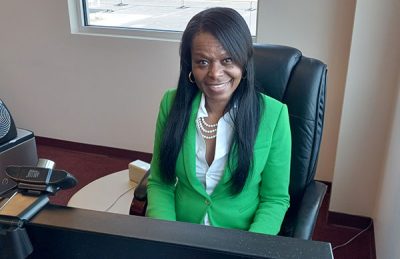A Healthcare Option for Those Who Have Nowhere Else to Turn
News Based on facts, either observed and verified directly by the reporter, or reported and verified from knowledgeable sources.

For 50 years, people in the southern and central part of Westchester County who don’t have health insurance or can’t afford the high cost of co-pays even with insurance have had someplace to go for their healthcare needs.
The Mount Vernon Neighborhood Health Center just doesn’t provide care for residents in that community and neighboring municipalities but its network oversees five other locations, including its facility at 295 Knollwood Rd. in Greenburgh that serves residents in central Westchester, including White Plains. The location was formerly the Greenburgh Health Center until it merged with Mount Vernon in 2013.
Between those two locations, its facility at 30 S. Broadway in Yonkers and the operations at the Grasslands Homeless Shelter in Valhalla, the Coachman Family Center in White Plains and Women’s Premier Obstetrics at 25 Lake St. in White Plains, there are about 130,000 visits a year from its roughly 20,000 registered patients, said Judith Watson, CEO of Mount Vernon Neighborhood Health Center.
It is one of a few networks of Federally Qualified Health Centers (FQHC) in Westchester, which not only helps keep people healthy but relieves the pressure on the hospital emergency rooms that the patients would most likely overwhelm if it didn’t exist, Watson said.
Anyone with or without insurance from anywhere can get their medical needs addressed.
“We are the safety net for the most vulnerable people in the community who have no place else to go,” she said. “At no time was it more important than during the COVID pandemic, which we’re still in, by the way.”
The health center not only provides basic preventative health measures such as annual physicals but a wide assortment of other services and specialties are offered, such as pediatrics, dentistry, obstetrics, behavioral health, ophthalmology and radiology.
“We have a lab on site,” Watson said. “It’s a one-stop shop for all ages. That’s very important. It’s one-stop shop.”
If a patient needs a service that the Mount Vernon Neighborhood Health Center can’t provide, it has an affiliation agreement with Westchester Medical Center so no one will be turned away for that specialty, she said.
The Mount Vernon Neighborhood Health Center sees patients with private insurance, Medicare or Medicaid as well as those without any coverage. Watson said about half of its patients have no insurance. It will also never refuse seeing a person because he or she is undocumented, Watson said.
The health center’s $25 million annual is supplemented by grants and donations, she said. For those with the ability to pay, their out-of-pocket costs are determined based on their income on a sliding scale.
One major advantage for those who seek out healthcare services from one of its 66 providers is that the center is enrolled in the 340b Health program, which cuts prescription medication costs for the public by about 70 percent.
Watson also dispelled what could be a misconception held by some members of the public that the quality of healthcare is lacking at an FQHC. All doctors, physician assistants and nurse practitioners are board certified, which means they have the same certifications as providers in high rents districts, she said.
“They go to the same colleges and university the doctors who are operating private facilities or who are working in some of the larger facilities that cater to those that have commercial insurance,” Watson said. “They get the same education. They sit for the same boards.”
Watson, a registered nurse, said she derives a great amount of satisfaction helping others. A White Plains High School graduate, she served in the U.S Army before going to college. After she was discharged, Watson went to Pace University, and in 2007, earned her master’s in public health at New York Medical College.
“The health center has been my life, and it’s my passion and service is my life,” Watson said.
In addition to overseeing the operation, her goal is to educate and inform the public on the health center’s value and to let people know who may need its services that it’s in the community.
Without it, during the darkest days of the pandemic, thousands of people would have had no place to turn for testing and later vaccinations, Watson said.
Black and brown communities have been disproportionately affected not only by COVID but hypertension, diabetes and asthma. The healthcare situation, which is already complicated, expensive and inaccessible for some, would be even more dire without the neighborhood health center.
“They would turn to the emergency room, and your tax bills would increase, our tax bills,” Watson said. “Some of them would stay home and die, and others would go to the emergency room. It’s as simple as that. It’s not a complicated thing. That’s why we were established.”
For more information on the Mount Vernon Neighborhood Health Center, call 914-699-7200 or visit www.mvnhc.org.

Martin has more than 30 years experience covering local news in Westchester and Putnam counties, including a frequent focus on zoning and planning issues. He has been editor-in-chief of The Examiner since its inception in 2007. Read more from Martin’s editor-author bio here. Read Martin’s archived work here: https://www.theexaminernews.com/author/martin-wilbur2007/
